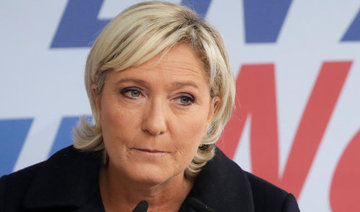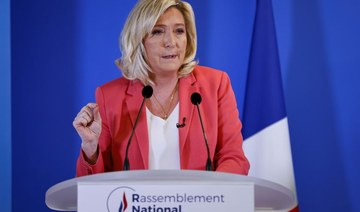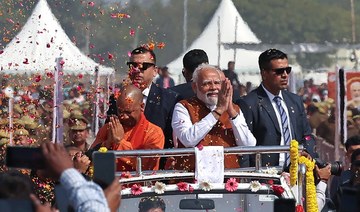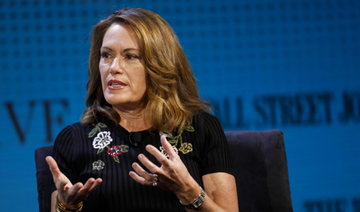PARIS: French far-right leader Marine Le Pen appeared in court Wednesday on charges she broke hate speech laws by tweeting pictures of Daesh atrocities, a case she slammed as a politically motivated attempt to silence her.
The trial comes as opinion polls show Le Pen will likely face off again against Emmanuel Macron in next year’s presidential contest, after her National Rally made its strongest showing ever in the 2017 vote.
Le Pen shared the gruesome images in December 2015, a few weeks after Daesh group extremists killed 130 people in attacks in Paris, in response to a journalist who drew a comparison between Daesh and her party.
One of the pictures showed the body of James Foley, an American journalist beheaded by the extremist militants.
Another showed a man in an orange jumpsuit being run over by a tank, and the third a Jordanian pilot being burned alive in a cage.
“Daesh is this!” Le Pen wrote in a caption.
“I am obviously the victim of a political trial,” Le Pen told journalists at the courthouse in Nanterre, a Paris suburb.
“The media published them, editorialists, newspapers, TV channels, and nobody was ever prosecuted for doing so — only Marine Le Pen is being prosecuted,” she said.
In 2018 a judge charged her as well as Gilbert Collard, a National Rally colleague who also tweeted the pictures, with circulating “violent messages that incite terrorism or pornography or seriously harm human dignity” and that can be viewed by a minor.
The crime is punishable by up to three years in prison and a fine of 75,000 euros ($90,000).
Le Pen, a lawyer by training, later deleted the picture of Foley after a request from his family, saying she had been unaware of his identity.
But on Wednesday she defended their publication, despite acknowledging that “I find these pictures horribly shocking.”
However, “It’s the crime that denigrates human dignity, not a picture of it.”
Le Pen also insisted she was the victim of a political witch-hunt — she was stripped of her parliamentary immunity over the pictures, and angrily rejected an order to undergo psychiatric tests as part of the inquiry.
Since taking over France’s main far-right party from her father, Le Pen has run twice for the French presidency, and recent polling shows her closer than ever to what for her would be the ultimate prize.
That has rekindled speculation about whether the anti-EU, anti-immigration populist could finally enter the Elysee Palace.
On Thursday, she is set to have a prime-time TV debate with Macron’s Interior Minister Gerald Darmanin, which will be closely watched after critics panned her debate performance against Macron before the 2017 vote.
Le Pen has another legal challenge looming, over claims that she and other party officials improperly spent millions of euros in public funds to pay their assistants while serving in the EU Parliament.
Investigators say almost seven million euros ($7.7 million) was diverted from the European Parliament between 2009 and 2017.
French far-right leader Le Pen on trial over Daesh tweets
https://arab.news/6prnj
French far-right leader Le Pen on trial over Daesh tweets

- A far-right leader appeared in court on charges she broke hate-speech laws by tweeting pictures of Daesh atrocities
- The leader slammed the case as a politically motivated attempt to silence her
Israeli journalist threatened over probe into spy chief’s intimidation of ICC: Report

- Gur Megiddo claimed authorities summoned him to issue a ‘polite threat’ about the consequences of his investigation
- Revelation comes days after story of Mossad’s alleged attempt to pressure former prosecutor to drop ICC case against Israel
LONDON: An Israeli journalist has claimed he was threatened by senior security officials to ensure he dropped his investigation into claims that Mossad had intimidated a former prosecutor of the International Criminal Court.
In an article published on Thursday, Gur Megiddo, an investigative reporter at Haaretz, claimed that Mossad officials, a few years ago, sought to block any reporting on the matter using intimidating tactics.
This comes in the wake of a report by The Guardian earlier this week that Mossad’s former head Yossi Cohen had tried to intimidate then-ICC prosecutor Fatou Bensouda. Cohen had allegedly attempted to stop Bensouda from investigating Israel for war crimes and crimes against humanity in the occupied Palestinian territories.
That investigation, launched in 2021, culminated last week in Bensouda’s successor, Karim Khan, announcing he was seeking an arrest warrant for Israel’s Prime Minister Benjamin Netanyahu over the country’s conduct in its war on Gaza.
“At the beginning of 2022, I attempted to contact the former prosecutor through a third party who knew her,” Megiddo wrote.
“Bensouda never responded to the approach, but days after the attempt, when I wanted to publish the story, my phone rang and on the other end of the line was the voice of a senior security official. ‘Can you come to see me tomorrow?’ he asked.”
The journalist claimed that during the meeting with two officials, he was told to drop the case or face the “consequences” of his actions.
“It was a polite conversation, a polite threat,” Megiddo wrote. “The tone was calm, the content much less so. I was explained that if I publish the story, I would suffer the consequences and get to know the interrogation rooms of the Israeli security authorities from the inside.
“In the end, it was made clear to me that even sharing the information ‘with my friends abroad,’ referring to foreign media outlets, would lead to the same results,” he added.
Megiddo’s revelations appear to confirm The Guardian’s report, which was part of a wider investigation. This was conducted by the outlet with the Israeli-based magazines +972 and Local Call on Israel’s use of its intelligence agencies to allegedly surveil, hack, pressure, smear, and threaten senior staff at the ICC to derail its inquiries relating to Palestine.
He explained that after the meeting, he “took the threats very seriously” and decided to publish a redacted version of the story he was working on, reporting only on Cohen’s trips to the Congo.
He left out the part about the agency’s effort to persuade Congo’s president, Joseph Kabila, to assist with efforts to pressure Bensouda and disrupt the proceedings in The Hague.
The revelations come amid a backdrop of declining media freedom in Israel. The +972 magazine and the Movement for Freedom of Information in Israel reported that in 2023, the military censor barred the publication of 613 articles — a record annual number since +972 began collecting data in 2011.
Earlier in May, authorities shut down the offices of Qatar’s media outlet Al Jazeera after passing a highly controversial law granting Israel the power to temporarily close foreign media outlets if deemed a threat to security.
Last week, equipment belonging to The Associated Press was briefly seized, prompting an intervention by the US government.
Google launches Gemini Advanced & Gemini mobile app in Arabic

- Android users can download a dedicated Gemini app while iOS users can access it through the Google app
- ‘We’re excited to see how people will utilize generative AI to enhance their productivity and creativity,’ says Google’s regional marketing chief
DUBAI: Google has added Arabic support to the mobile app for Gemini, its multimodal artificial intelligence model. Users worldwide can access it for free through a dedicated app for Android devices, or from within the Google app on iOS.
An Arabic version of its latest conversational AI model, Gemini Advanced, is also now available through the app to subscribers with a Google One AI Premium plan.
“Businesses now have access to our latest Gemini model (Gemini Advanced) in Arabic to help increase their efficiency in complex and collaborative tasks,” Najeeb Jarrar, Google’s regional marketing director for the Middle East and North Africa region, told Arab News.
“With access to Gemini on mobile, we’re excited to see how people will utilize generative AI to enhance their productivity and creativity.”
The app also provides access to Gemini 1.0 Pro, a different AI model, for free, and to Gemini 1.5 Pro with a Google One AI Premium plan. The 1.5 Pro model is more capable at complex tasks such as coding, logical reasoning, following detailed and specific instructions, and collaborating on creative projects, Google said.
Users can access other Google apps and services from within the Gemini app through the use of extensions launched this year. The services provided by these extensions include access to real-time flight and hotel booking information, location-based information from Google Maps, and summaries of content from Google Docs or Gmail.
The Arabic version of Gemini, then called Bard, was launched in July last year. Google described Bard as an “AI experiment,” not a chatbot, and Jarrar said it would allow the company to explore a “new paradigm in computing.”
He told Arab News at the time: “We’re learning together how large language models can be helpful, and how to minimize poor experiences.”
Now, the Arabic capabilities have been added to the Gemini mobile app and Gemini Advanced. The AI is able to understand questions in more than 16 Arabic dialects and provide responses in modern, standard Arabic.
Google announced several new developments in its AI projects during its developer conference Google I/O 2024 this month. Arabic support for these new features is expected to be added soon.
“As we’re seeing more interest from the region, we’re committed to bringing more features in Arabic later this year,” Jarrar added.
Saudi tech startup in ‘augmented reality’ deal with Google

- Magic Leap working on ‘immersive experiences that blend the physical and digital worlds’
JEDDAH: A Saudi-owned tech startup has gone into partnership with Google, prompting speculation that the aim is to launch a new augmented reality device to rival those by Meta and Apple.
The startup, Magic Leap, is based in Florida and has expertise in optics and device manufacturing. It is working with Google on “building immersive experiences that blend the physical and digital worlds,” it said.
“We’ve shipped a couple of different versions of augmented reality devices so far, so we’re out there delivering things, and Google has a long history of platforms thinking,” Magic Leap’s chief technology officer Julie Larson-Green said. “So we’re thinking, putting our expertise and their expertise together, there’s lots of things we could end up doing.”
Google is an investor in Magic Leap, which is majority owned by the Public Investment Fund, Saudi Arabia’s sovereign wealth fund. The startup was an early innovator in augmented reality, but struggled to find a consumer niche and more recently started exploring arrangements to licence its technology or produce components for others.
If Google were to jump back into making an augmented reality device, it would be yet another dramatic twist in the company’s on-again, off-again relationship with the technology. It was also an early mover more than a decade ago, when it introduced its Google Glass smart glasses in 2012.
However, consumers recoiled at the product’s clunky design and privacy concerns, and Google retreated from the consumer market in 2015 and later abandoned the enterprise market as well.
Labour Party dumps UK election candidate over 10-year-old tweets about Israel and Islamophobia

- Faiza Shaheen blocked from standing for the party at the General Election on July 4 because of a handful of interactions on social media platform X over the past decade
- The tweets include one about her experience of Islamophobia in the party, and a clip from The Daily Show in which host Jon Stewart discussed Israel’s actions in Gaza in 2014
LONDON: Labour Party bosses have blocked a candidate from standing at the upcoming UK General Election because of a handful of interactions on social media platform X, formerly Twitter, over the past 10 years.
In one case, economist and academic Faiza Shaheen “liked” a video of a TV comedy sketch about Israel by acclaimed American comedian Jon Stewart, host of satirical news program The Daily Show. In another she wrote about her own experiences with Islamophobia within the Labour party.
Shaheen said she was informed on Wednesday night that she could not stand for the party at the election, after she was called to a meeting to discuss accusations of antisemitism and other misconduct. She told the BBC’s Newsnight program on Wednesday of her shock upon receiving the email confirming her candidacy had been blocked.
“Fourteen tweets since 2014 — 10 years,” she said. “Three of those were about the Green Party, me liking my friends’ tweets before I joined the Labour Party, and one of them was about my experiences of Islamophobia in the party.
“How am I not allowed to talk about my experiences of Islamophobia and the double standards that I’ve seen.”
I’m genuinely worried for my civil liberties under a @Keir_Starmer government.
— Aaron Bastani (@AaronBastani) May 29, 2024
Watch this, from @faizashaheen tonight on #newsnight pic.twitter.com/Qy2suvfuvd
Shaheen, an academic who specializes in the study of inequality, had been presented with a list of tweets earlier in the day, including one that included a clip from The Daily Show broadcast in July 2014. In it, host Stewart, who is of Jewish heritage, starts to discuss an Israeli ground offensive during the 2014 Gaza War. He is immediately surrounded and rebuked by four of the Comedy Central show’s correspondents who, as part of the show’s satirical commentary on the issue, accuse him of being a “self-hating Jew” for questioning the actions of Israel.
Shaheen’s interaction with video on social media prompted a complaint from the Jewish Labour Movement, which is affiliated with the Labour Party.
“It was the middle of the night, if you look at the time. I was probably with the baby, breastfeeding. I don’t even remember liking that tweet,” she said during her appearance on Newsnight.
She later accused the Labour Party of waging “a systematic campaign of racism, Islamophobia and bullying” and alleged that the party, led by Keir Starmer, has “a problem with black and brown people.”
Adding that she will challenge the party’s decision in the courts, she said: “This campaign of prejudice, bullying and spiteful behavior has finally been rewarded by Labour’s NEC (National Executive Committee) and my name has been added to the list of those not welcome in the candidate club. And it is no surprise that many of those excluded are people of color.”
Stewart reacted to the Labour Party’s action against Shaheen with a message on Twitter in which he wrote: “This is the dumbest thing the UK has done since electing Boris Johnson.”
The decision by Labour bosses to prevent Shaheen from standing in the Chingford and Woodford Green constituency in North East London comes as the party campaigns for the General Election on July 4, which many experts predict will result in a landslide victory for the party.
However, under Starmer, who became leader in 2020, the party has faced criticism on a number of issues, including its stance on the war in Gaza and its handling of internal matters.
In 2020, watchdogs ruled that the party was responsible for “unlawful” acts of antisemitic harassment and discrimination during the four-and-a-half years when Starmer’s predecessor, Jeremy Corbyn, was party leader.
Arab News columnist Baria Alamuddin receives lifetime achievement honor at May Chidiac Foundation Media Awards

- The MCF Awards ceremony was held on in Dubai, UAE, for the second year
- Mamdouh Al-Muhaini, general manager of Al Arabiya and Al Hadath, received the Excellence in the Media Industry Award
DUBAI: Acclaimed international journalist and broadcaster Baria Alamuddin was celebrated at the May Chidiac Foundation Media Awards for her valuable contributions to the Arab world’s media industry.
Alamuddin, an Arab News columnist, editor of the Media Services Syndicate and former foreign editor of Al-Hayat newspaper, accepted the Antoine Choueiri Special Tribute for Lifetime Achievement during Tuesday’s ceremony.
Presenting the accolade were Pierre Choueiri, CEO and chairman of the leading media representation group in the Middle East, Choueiri Group, and Lebanon’s ambassador to the UAE, Fouad Chehab Dandan.
The annual MCF Awards, hosted by Dubai for the second year in a row, recognized the contributions of several other prominent figures in the Arab media industry.
Awards were presented by MCF President May Chidiac and other notable media personalities, including Lebanese journalist and writer Samir Atallah, CEO of International Media Investments and former CNN Commercial Worldwide president Rani Raad, and Beirut Institute founder and executive chairman Raghida Dergham.
Mamdouh Al-Muhaini, general manager of Al Arabiya and Al Hadath, accepted the Excellence in the Media Industry Award.
The Excellence in Media Award went to Nadim Koteich, general manager of Sky News Arabia, International Media Investments, to recognize his commitment to excellence and his impact on the media landscape over the past two decades.
Palestinian journalist Heba Akila, best known for her coverage of the Israeli onslaught on the Gaza Strip, was recognized for her Courage in Journalism.
Anas Bukhash, entrepreneur and podcast presenter of ABTalks, accepted the Content Development Award from award-winning international journalist Hadley Gamble and Bahraini business pioneer Akram Miknas, who heads Promoseven Holdings.
Award-winning investigative journalist and television host at France 2, Elise Lucet, received the Engaged Journalist Award, presented by Nobel laureate Ouidad Bouchamaoui and Lebanese Member of Parliament Ghassan Hasbani.
The Outstanding Media Performance Award was presented to American journalist and war reporter Ben Wedeman, CNN’s Beirut-based senior international correspondent.
Founded by journalist and former Lebanese Minister for Administrative Development May Chidiac, the foundation is a not-for-profit organization dedicated to research and development in the fields of media, international affairs, women’s rights, democracy and social welfare, among others, with the aim of establishing Lebanon as a proactive player in the Middle East and global economy.



















